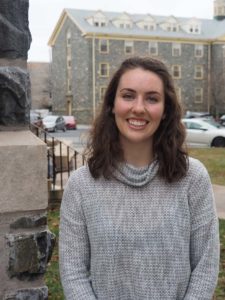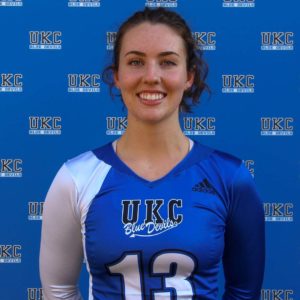The University of King’s College is thrilled to announce that fourth-year science student Isabelle Roach has received a Rhodes Scholarship to pursue an MSc in neuroscience at the University of Oxford next year.

Isabelle Roach of Halifax is the 32nd King’s student to become a Rhodes Scholar. She will pursue a masters in neuroscience at Oxford next year.
The Rhodes Scholarship is one of the world’s most prestigious scholarships. Rhodes defines its scholars as people who have a vision of how the world could be better and the energy to make a difference. Roach is the 32nd King’s student to become a Rhodes Scholar. Considering King’s tiny size, this means it has one of the highest number of Rhodes Scholars per capita of any university in or beyond Canada.
“In her four years at King’s and Dalhousie, Isabelle has made an indelible mark on her academic community, excelled at athletics, and created opportunities for her fellow students to become environmental stewards,” said King’s President William Lahey. “We are incredibly proud of her many accomplishments.”
Roach came to King’s from Halifax’s Citadel High School to begin her post-secondary education with King’s interdisciplinary Foundation Year Program, a chronological study of great books and ideas from the ancient to the contemporary world. Roach calls it her most formative educational experience for instilling in her the curiosity and courage to become involved in more than just academics. “I was taught to question everything I was learning, as well as how and why I was learning it,” Roach said. “I have never learned more…I became a more open-minded, considerate and diligent student with every new reading.”
Since 2017, Roach has taken many courses at Dalhousie University as a King’s student while pursuing an honours biology degree. Dr. Chris Moore, Dalhousie Provost and Vice-President (acting), knew Isabelle in his role as Dean of Science at Dalhousie. “Isabelle illustrates what is best about the King’s-Dalhousie educational relationship—the seamless transition from exceptional first-year general liberal arts and science education at King’s to strong disciplinary focus at Dalhousie. She has excelled in both contexts, while providing leadership to both communities, and we are enormously proud of her achievements.” At Dalhousie, she has earned awards two years in a row for having the highest academic standing in her biology classes.
“Isabelle exemplifies the opportunity that the King’s and Dalhousie partnership provides to students who want an education that melds the humanities and the sciences, with each enriching the other,” said President Lahey. “Now more than ever, the world needs leaders like Isabelle who have this kind of interdisciplinary formation.”

Isabelle is the captain of the King’s women’s volleyball team and this year she was one of the inaugural recipients of the Debra Deane Little and Robert Little Academic Scholarships for Varsity Athletes
Roach is already contributing to medical research, receiving an NSERC undergraduate student research award to work in a medical neuroscience lab. Like the Foundation Year Program, she said it has challenged her to do more than sit in a classroom and memorize information: “Both have required me to actively challenge myself, think independently, try new things, fail at them, and get up to try again.”
Challenging herself is a recurrent theme in Roach’s life. Through her work with Shad Canada, she has managed a STEM-focused education program for youth from across the country. She founded a group called King’s College Students for Sustainability that is passionate about environmental change. And she sings in a choir dedicated to highlighting social justice issues through music.
Additionally, Roach challenges herself through athletics. Choosing to come to King’s allowed Roach to balance her deep commitment to her studies with competitive sports; she’s played Blue Devils varsity volleyball for four years at King’s—this year assuming the role of team captain. She’s won athletics awards at King’s and is one of the inaugural recipients of the Debra Deane Little and Robert Little Academic Scholarships for Varsity Athletes, awarded to King’s students who combine high academic standing with participation in varsity sports.
Roach’s short-term goals are to continue educating people of all ages about climate change, and her long-term goals are to focus on the integrated health of the environment and population. She intends to use her interest in medical research and future work as a clinician to bring health care to underprivileged populations, while maintaining her interest in the environmental impacts of health care. Through it all, she’s also committed to practicing uncompromising empathy, and continuing to learn so that she may in turn educate others.

